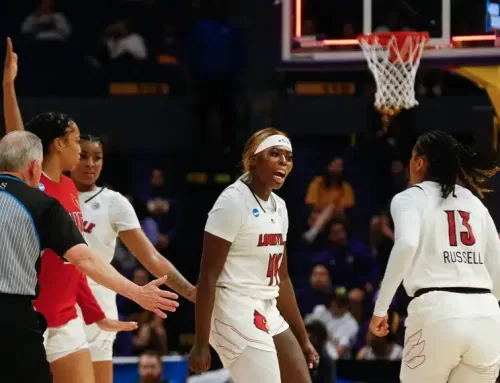As U of L enters the ACC, peer pressure is being placed upon the university to increase its academic standards. One of the major elements of this is the six-year graduation rate.
According to U of L’s preliminary data, the six-year graduation rates for 2014 is 53.6 percent, which is a 23.5 percent increase from the 1998 reporting year. U of L has also gone from having the lowest graduation rate among Kentucky public schools to being behind only UK, who has a nearly 60 percent rate.
“Post quantitative indicators would show up as the low end of the ACC schools,” said U of L president James Ramsey. “Still, those same indicators would show we have made tremendous progress over time – our goal is to continue to make progress and in fact, several of the ACC schools are what we call our aspirational peers.”
Dale Billingsley, vice provost for undergraduate affairs, credits this growth to initiatives such as the flight plan, welcome week and on-campus housing requirements.
“When I came here, this really was a commuter school,” said Billingsley. “It is not just living on campus,” he said, mentioning that students who are highly involved in campus life are more likely to stay.
However, retention is still an issue at U of L despite these initiatives.
“The biggest drop for us is after the first year,” he said. “Something about college does not fit into their lives very well.”
According to Billingsley, one in three students who do not return respond to exit interviews.
“The ones who do respond will say that they had academic problems, that they had financial problems, or that they had personal problems,” he said.
He said that the first two problems are easy to determine, while that last one can vary greatly.
“In general, students who come in with a major in mind, and are admitted to the academic unit where that major is offered, tend to stay at school more than students who come into school without a major,” said Billingsley.
He stated that this often goes back to students unwilling to pay for school when they get beyond general education requirements if they are unsure what they want to study. The flight plan, which is a projected path for students to earn their degree, was designed to encourage graduation within six years.
“That’s what Flight Plan was meant to do.”
Billingsley also mentioned that going forward, advising will develop new tools to help students create a flight plan
“The kind of information we can get by looking at the whole database of grades and student performance, will probbaly tell us that if you think you are going to be a history major and you got a C minus in history 101, the chances of you finishing that degree are very low,” said Billingsley. “That’s a ways down the way.”
This method, called predictive analytics, will once day help students make advising choices based on statistical data.
Going forward, the university will continue to focus on raising retention rates to the state goal of 60 percent.
“A lot of students are not concerned about retention,” said Billingsley. “This is really a concern for the university partly because the state looks at it.”
Photo Courtesy University of Louisville





